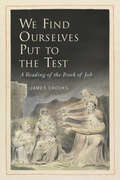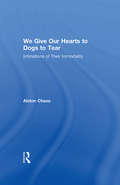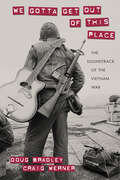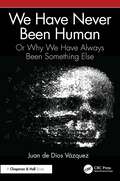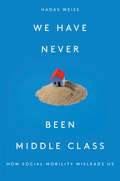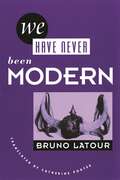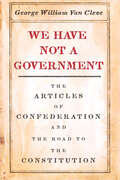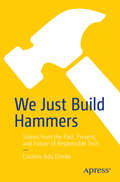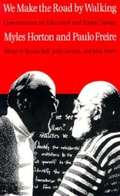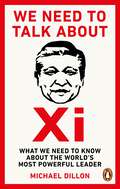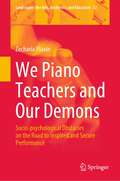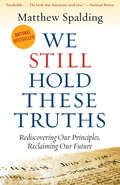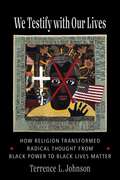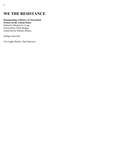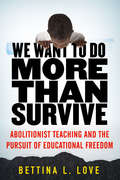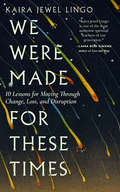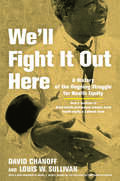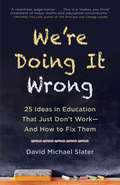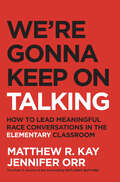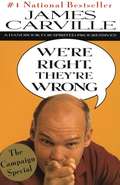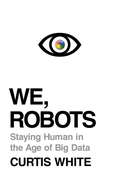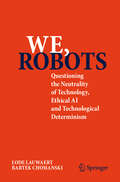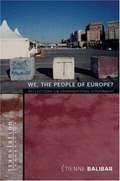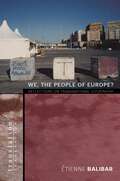- Table View
- List View
We Find Ourselves Put to the Test: A Reading of the Book of Job
by James CrooksDoes the world we inhabit offer us hospitality or indifference? This question is central to the spiritual literature of all cultures. In We Find Ourselves Put to the Test James Crooks returns to the Bible’s book of Job to explore the enduring relevance of that question and its philosophical dimensions. Beginning with the puzzle of Job’s famous stoicism and nihilism in the face of loss, Crooks explores the contradictions of suffering as dramatized in the dialogue between Job and his friends. How is it that the friends’ attempt to comfort Job with a rational explanation of his misfortune devolves seamlessly into victim blaming? How is it that Job’s own renunciation of life at the nadir of his pain converts into an intellectual patience that outlasts the advocates of rational explanation? We Find Ourselves Put to the Test gives a portrait of the suffering protagonist looking into the heart of a creation that is, by necessity, both indifferent and hospitable. A philosophical exploration of one of the most enigmatic books in the Bible, We Find Ourselves Put to the Test goes beyond critical interpretation and suggests a way of reading the book of Job that is animated by a consideration of the reader’s narratives and communities, and the limits of his or her own understanding.
We Give Our Hearts to Dogs to Tear: Intimations of Their Immortality
by Alston ChaseMore than a hauntingly beautiful memoir about small dogs in Big Sky country, this book is a wise account of the relationships among dogs, humans, and the land that surrounds them. It is the story of successive generations of Jack Russell terriers, their animal friends, and their human companions. Alston Chase searches for the immortality of dogs, what makes them unique companions, and why we humans willingly give them our hearts knowing that someday they will be broken. This book will resonate with anyone who has ever loved a dog.Chase muses that dogs are the embodiment of spirit over mortality and through the window of their brief lives we glimpse eternity. This eternal includes the Earth, the land, and the bonds forged between people and dogs over thousands of years. Chase sees threats in the decline of rural life, unbridled urbanization, and in dog breeders who judge by conformation to breed standards and fashion rather than ability and health.An uplifting tribute to the dogs we love, and a reflection on the limitations of life, this book shows a triumph of the spirit. Rich in poetic citations, it is an environmental cry for help, a naturalistic appreciation of a dissolving world, and a deeply spiritual reminder that nothing loved is ever lost.
We Gotta Get Out of This Place: The Soundtrack of the Vietnam War (Culture and Politics in the Cold War and Beyond)
by Craig Werner Doug Bradley&“The diversity of voices and songs reminds us that the home front and the battlefront are always connected and that music and war are deeply intertwined.&” —Heather Marie Stur, author of 21 Days to Baghdad For a Kentucky rifleman who spent his tour trudging through Vietnam&’s Central Highlands, it was Nancy Sinatra&’s &“These Boots Are Made for Walkin&’.&” For a black marine distraught over the assassination of Martin Luther King Jr., it was Aretha Franklin&’s &“Chain of Fools.&” And for countless other Vietnam vets, it was &“I Feel Like I&’m Fixin&’ to Die&” or the song that gives this book its title. In We Gotta Get Out of This Place, Doug Bradley and Craig Werner place popular music at the heart of the American experience in Vietnam. They explore how and why U.S. troops turned to music as a way of connecting to each other and the World back home and of coping with the complexities of the war they had been sent to fight. They also demonstrate that music was important for every group of Vietnam veterans—black and white, Latino and Native American, men and women, officers and &“grunts&”—whose personal reflections drive the book&’s narrative. Many of the voices are those of ordinary soldiers, airmen, seamen, and marines. But there are also &“solo&” pieces by veterans whose writings have shaped our understanding of the war—Karl Marlantes, Alfredo Vea, Yusef Komunyakaa, Bill Ehrhart, Arthur Flowers—as well as songwriters and performers whose music influenced soldiers&’ lives, including Eric Burdon, James Brown, Bruce Springsteen, Country Joe McDonald, and John Fogerty. Together their testimony taps into memories—individual and cultural—that capture a central if often overlooked component of the American war in Vietnam.
We Have Never Been Human: Or Why We Have Always Been Something Else
by Juan de Dios VázquezWe Have Never Been Human: Or Why We Have Always Been Something Else boldly reimagines what it means to be human, challenging the traditional notions that bind our identity to biology and culture. From ancient mythologies to modern technologies, this book reveals a dynamic, ever-evolving human identity shaped by external forces and technological advancements.Blending insights from philosophy, technology studies, anthropology, and cultural critique, We Have Never Been Human: Or Why We Have Been Something Else offers an interdisciplinary exploration of our constructed identities and what they portend for the future of society. It raises essential questions: How has technology reshaped our self-perception? Are humans fixed beings, or are we endlessly evolving? What ethical, social, and political challenges arise as we integrate with intelligent machines?This book is a compelling read for those intrigued by the intersection of humanity and technology, offering profound insights into the essence of what it means to be human—or perhaps, what it means to evolve beyond the human.
We Have Never Been Middle Class: How Social Mobility Misleads Us
by Hadas WeissTaking apart the ideology of the "middle class"Tidings of a shrinking middle class in one part of the world and its expansion in another absorb our attention, but seldom do we question the category itself. We Have Never Been Middle Class proposes that the middle class is an ideology. Tracing this ideology up to the age of financialization, it exposes the fallacy in the belief that we can all ascend or descend as a result of our aspirational and precautionary investments in property and education. Ethnographic accounts from Germany, Israel, the USA and elsewhere illustrate how this belief orients us, in our private lives as much as in our politics, toward accumulation-enhancing yet self-undermining goals. This original meshing of anthropology and critical theory elucidates capitalism by way of its archetypal actors.
We Have Never Been Modern
by Bruno LatourWith the rise of science, we moderns believe, the world changed irrevocably, separating us forever from our primitive, premodern ancestors. But if we were to let go of this fond conviction, Bruno Latour asks, what would the world look like? His book, an anthropology of science, shows us how much of modernity is actually a matter of faith. What does it mean to be modern? What difference does the scientific method make? The difference, Latour explains, is in our careful distinctions between nature and society, between human and thing, distinctions that our benighted ancestors, in their world of alchemy, astrology, and phrenology, never made. But alongside this purifying practice that defines modernity, there exists another seemingly contrary one: the construction of systems that mix politics, science, technology, and nature. The ozone debate is such a hybrid, in Latour's analysis, as are global warming, deforestation, even the idea of black holes. As these hybrids proliferate, the prospect of keeping nature and culture in their separate mental chambers becomes overwhelming--and rather than try, Latour suggests, we should rethink our distinctions, rethink the definition and constitution of modernity itself. His book offers a new explanation of science that finally recognizes the connections between nature and culture--and so, between our culture and others, past and present. Nothing short of a reworking of our mental landscape. We Have Never Been Modern blurs the boundaries among science, the humanities, and the social sciences to enhance understanding on all sides. A summation of the work of one of the most influential and provocative interpreters of science, it aims at saving what is good and valuable in modernity and replacing the rest with a broader, fairer, and finer sense of possibility.
We Have Not a Government: The Articles of Confederation and the Road to the Constitution
by George William Van CleveIn 1783, as the Revolutionary War came to a close, Alexander Hamilton resigned in disgust from the Continental Congress after it refused to consider a fundamental reform of the Articles of Confederation. Just four years later, that same government collapsed, and Congress grudgingly agreed to support the 1787 Philadelphia Constitutional Convention, which altered the Articles beyond recognition. What occurred during this remarkably brief interval to cause the Confederation to lose public confidence and inspire Americans to replace it with a dramatically more flexible and powerful government? We Have Not a Government is the story of this contentious moment in American history. In George William Van Cleve’s book, we encounter a sharply divided America. The Confederation faced massive war debts with virtually no authority to compel its members to pay them. It experienced punishing trade restrictions and strong resistance to American territorial expansion from powerful European governments. Bitter sectional divisions that deadlocked the Continental Congress arose from exploding western settlement. And a deep, long-lasting recession led to sharp controversies and social unrest across the country amid roiling debates over greatly increased taxes, debt relief, and paper money. Van Cleve shows how these remarkable stresses transformed the Confederation into a stalemate government and eventually led previously conflicting states, sections, and interest groups to advocate for a union powerful enough to govern a continental empire. Touching on the stories of a wide-ranging cast of characters—including John Adams, Patrick Henry, Daniel Shays, George Washington, and Thayendanegea—Van Cleve makes clear that it was the Confederation’s failures that created a political crisis and led to the 1787 Constitution. Clearly argued and superbly written, We Have Not a Government is a must-read history of this crucial period in our nation’s early life.
We Just Build Hammers: Stories from the Past, Present, and Future of Responsible Tech
by Coraline Ada EhmkePhilosopher Noam Chomsky is famously quoted as saying that technology is neither good nor bad, but simply a neutral tool. He likens it to a hammer, which can be used by carpenters and torturers alike. While the neutrality of tech is an idea that appeals to many technologists, this perspective is out of alignment with today's realities of pervasive ad-tech, surveillance capitalism, algorithmic manipulation, and rising techno-fascism. We Just Build Hammers applies a lens of speculative and science fiction to connect you with a historical lineage of thinkers and activists in the responsible tech movement. Its narrative spans a century of major technological upheavals: from the advent of the atomic age to the formative years of computing; from the hacker visionaries of the turn of the century to the tech justice revolutionaries of today. This book challenges technologists to consider for themselves whether they're really just "building hammers"– technologies whose potential for good balances their potential for harm– or if they are unwittingly contributing to systems that exacerbate inequality, inequity, and injustice. What You Will Learn A historic grounding and a science fiction perspective to help untangle the difficult and fraught topic of tech ethics Ways to bring ethical considerations into the development of new technologies How to navigate the increasing complexity of the techno-social world we live and work in Who This Book is For Designed to appeal broadly, not just to engineers and technologists, but to anyone interested in the history and future of ethics and technology.
We Make the Road by Walking: Conversations on Education and Social Change
by Myles Horton Paulo Freire Brenda Bell John Gaventa John PetersIn December 1987, Myles Horton and Paulo Freire, two pioneers of education for social change, came together to "talk a book" about their experiences and ideas. Though they came from different environments--one from the rural mountains of Appalachia, the other from São Paulo, the largest industrial city in Brazil--Myles and Paulo shared a vision and a history of using participatory education as a crucible for empowerment of the poor and powerless.
We Need To Talk About Xi: What we need to know about the world’s most powerful leader
by Michael DillonMeet the most powerful leader in the world. Chinese premier Xi Jinping graces our television screens and news headlines on a regular basis. But even after a decade in power, he remains shrouded in mystery.From growing up with a father purged in Mao's Cultural Revolution and his mission to eradicate poverty, to his persecution of Uyghur Muslims and paranoia about being likened to Winnie-the-Pooh, Xi Jinping is a man obscured by caricatures. In this short, essential primer, historian and writer Michael Dillon unveils the character of Xi Jinping - arguably the world's most powerful man - to truly understand his grip on China, what he wants and how the West gets him wrong.But this is not just the story of Xi; this is the story of today's largest economic powerhouse, which dives into the crux of the issue - what does Xi's leadership of China mean for the rest of the world, and what will he do next?
We Piano Teachers and Our Demons: Socio-psychological Obstacles on the Road to Inspired and Secure Performance (Landscapes: the Arts, Aesthetics, and Education #32)
by Zecharia PlavinThis book focuses on piano teachers and the many pains they encounter in their careers. These pains play an essential role in blocking the musical inspiration of their students. The author identifies with the sensitivities of the teachers, aiming at the inspiration permeated and safer playing of their students.The book penetrates the protective mechanisms of the teachers that, on the one hand, maintain their professional functioning, while on the other hand, block refreshing ideas. It combines exploration of secure and culturally informed inspired playing, coping with exaggerated anxiety and understanding the interaction of piano actions with pianist’s physiology.This book helps to open teachers’ perceptions of the ways to enable more secure and more inspired performances while remembering the inner feelings of the piano teachers.
We Still Hold These Truths
by Matthew SpaldingThe Essential Guide to Rolling Back the Progressive Assault and Putting America Back on CourseMany Americans are concerned, frightened, angry. The country, it seems, is on the wrong track.But what is the right course for America? Knowing what we stand against is not the same as knowing what we stand for.Just in time, Matthew Spalding provides the plan for translating angst into proper action in this bestselling book. We Still Hold These Truths offers a bracing analysis of how and why we have lost our bearings as a nation and lays out the strategy to rescue our future from arbitrary and unlimited government.
We Testify with Our Lives: How Religion Transformed Radical Thought from Black Power to Black Lives Matter (Columbia Series on Religion and Politics)
by Terrence L. JohnsonPolice killings of unarmed Black people have ignited a national and international response unlike any in decades. But differing from their civil rights-oriented predecessors, today’s activists do not think that the institutions and values of liberal democracy can eradicate structural racism. They draw instead on a Black radical tradition that, Terrence L. Johnson argues, derives its force from its unacknowledged ethical and religious dimensions.We Testify with Our Lives traces Black religion’s sustained influence from SNCC to the present, reconstructing a radical lived ethics of freedom and justice. Johnson demonstrates that Black Power fundamentally contests liberalism’s abstract understanding of democracy, calling instead for new embodied frameworks to achieve human flourishing and dignity. Black bodies represent the primary form of resistance against violent and oppressive regimes of white supremacy and exploitation, and the individual and collective struggles of Black life bear witness to the dogged determination to cultivate beauty, rage, and joy.Considering the writings of Audre Lorde, Toni Cade Bambara, Stokely Carmichael, Martin Luther King Jr., Malcolm X, and James Baldwin, We Testify with Our Lives makes its case through a new narrative of the evolution of Black radicalism from the civil rights movement through the Movement for Black Lives. It forges new insights into Black Power’s vital contributions to debates on ethics, transnational politics, democracy, political solidarity, and freedom—and its potent resources for the ongoing struggle to build democratic possibilities for all.
We The Resistance: Documenting A History Of Nonviolent Protest In The United States
by Chris Hedges Michael G. Long Dolores Huerta"A highly relevant, inclusive collection of voices from the roots of resistance. . . . Empowering words to challenge, confront, and defy."--Kirkus Reviews "This book fights fascism. This books offers hope. We The Resistance is essential reading for those who wish to understand how popular movements built around nonviolence have changed the world and why they retain the power to do so again."—Jonathan Eig, author of Ali: A Life
We Want to Do More Than Survive: Abolitionist Teaching and the Pursuit of Educational Freedom
by Bettina LoveDrawing on personal stories, research, and historical events, an esteemed educator offers a vision of educational justice inspired by the rebellious spirit and methods of abolitionists.Drawing on her life's work of teaching and researching in urban schools, Bettina Love persuasively argues that educators must teach students about racial violence, oppression, and how to make sustainable change in their communities through radical civic initiatives and movements. She argues that the US educational system is maintained by and profits from the suffering of children of color. Instead of trying to repair a flawed system, educational reformers offer survival tactics in the forms of test-taking skills, acronyms, grit labs, and character education, which Love calls the educational survival complex. To dismantle the educational survival complex and to achieve educational freedom--not merely reform--teachers, parents, and community leaders must approach education with the imagination, determination, boldness, and urgency of an abolitionist. Following in the tradition of activists like Ella Baker, Bayard Rustin, and Fannie Lou Hamer, We Want to Do More Than Survive introduces an alternative to traditional modes of educational reform and expands our ideas of civic engagement and intersectional justice.
We Were Made for These Times: Skillfully Moving through Times of Transition and Challenge
by Kaira Jewel LingoIn ten concise chapters, you'll learn powerful ways to meet life's challenges with wisdom, resilience, and ease.We all go through times when it feels like the ground is being pulled out from under us. What we relied on as steady and solid may change or even appear to vanish. In this era of global disruption, threats to our individual, social, and planetary safety abound, and at times life can feel overwhelming. Not only are loss and separation painful, but even positive changes can cause great stress. Yet life is full of change: birth, death, marriage, divorce; a new relationship; losing or starting a job; beginning a new phase in life or ending one. Change is stressful, even when it is much desired or anticipated—the unknown can feel scary and threatening. In We Were Made for These Times, the extraordinary mindfulness teacher Kaira Jewel Lingo imparts accessible advice on navigating difficult times of transition, drawing on Buddhist teachings on impermanence to help you establish equanimity and resilience. Each chapter in We Were Made for These Times holds an essential teaching and meditation, unfolding a step-by-step process to nurture deeper freedom and stability in daily life. Time-honored teachings will help you develop ease, presence, and self-compassion, supporting you to release the fear and doubt that hold you back.
We'll Fight It Out Here: A History of the Ongoing Struggle for Health Equity
by David Chanoff Louis W. SullivanHow a coalition of Black health professions schools made health equity a national issue.Racism in the US health care system has been deliberately undermining Black health care professionals and exacerbating health disparities among Black Americans for centuries. These health disparities only became a mainstream issue on the agenda of US health leaders and policy makers because a group of health professions schools at Historically Black Colleges and Universities banded together to fight for health equity. We'll Fight It Out Here tells the story of how the Association of Minority Health Professions Schools (AMHPS) was founded by this coalition and the hard-won influence it built in American politics and health care. David Chanoff and Louis W. Sullivan, former secretary of health & human services, detail how the struggle for equity has been fought in the field of health care, where bias and disparities continue to be volatile national issues. Chanoff and Sullivan outline the history of Black health care, from pre-Emancipation to today, centering on the work of AMHPS, which brought to light health care inequities in 1983 and precipitated virtually all minority health care legislation since then. Based on extensive research in the literature, as well as more than seventy interviews with the people central to this fight for legislative and policy change, We'll Fight It Out Here is the important story of a vital coalition movement, virtually unknown until now, that changed the national understanding of health inequities.The work of this coalition of Black health schools continues, both in supporting the training of more doctors and health professionals from minority backgrounds and in advancing issues related to health equity. By highlighting these endeavors, We'll Fight It Out Here brings attention to a pivotal group in the history of the health equity movement and provides a road map of practical mechanisms that can be used to advance it.
We're Doing It Wrong: 25 Ideas in Education That Just Don't Work—And How to Fix Them
by David Michael SlaterAn unapologetic critique of major flaws in the American education system. David Michael Slater’s We’re Doing It Wrong is a thought-provoking dissection of the issues plaguing American public schools. Each chapter identifies a major problem in the education system, exploring its roots and repercussions. A teacher himself, Slater opens up and gives readers an insider’s perspective on topics that have been at the center of ongoing debates as well as recent hot button issues, such as: • Standardized testing • Teacher evaluation practices • Helicopter parents • Class size • Poverty’s effect on performance • Anti-bullying programs • Writing proficiency • Curriculum goals Slater explains why our current approaches simply aren’t working—for students, for teachers, for the colleges that these students may eventually attend, and for society at-large. Unafraid to ruffle a few feathers, We’re Doing It Wrong highlights defects in policy and theory, calls out administration, and questions long-held beliefs. Every chapter concludes with a suggestion for improvement, offering light at the end of the tunnel. Administrators, teachers, and concerned parents will come away with a better understanding of the current state of education and ideas for moving toward progress—for themselves and for the students they support.
We're Gonna Keep On Talking: How to Lead Meaningful Race Conversations in the Elementary Classroom
by Jennifer Orr Matthew KayWhat should conversations about race look and sound like in the elementary classroom?How do we respond authentically and truthfully to children's questions about the world?And how can we build classroom communities that encourage these meaningful conversations about race?Matthew Kay and Jennifer Orr take on these questions and more in We're Gonna Keep On Talking: How to Lead Meaningful Race Conversations in the Elementary Classroom . A companion work to Kay's Not Light, But Fire , this book focuses on the unique and powerful role discussions about race can play in the elementary classroom.Drawing its title inspiration from the lyrics of the freedom song Ain't Gonna Let Nobody Turn Me Around,- sung by hundreds of children marching against segregation in what came to be known as the Children's Crusade of 1963, We're Gonna Keep On Talking is written for teachers who are willing to match children's courage and brilliance, and who believe that a foundation in meaningful race discourse will help [children] to seek justice for themselves and their neighbors, to be kinder, [and] more thoughtful.-Writing with the humility and honest storytelling of two career classroom teachers, Matthew Kay and Jennifer Orr share: Strategies for building safe and supportive classroom and school spaces for productive discourseDozens of practical teacher moves for facilitating race conversationsClassroom stories that allow readers to envision ways into the work through picture books, art, graphs, historical photographs, and current eventsTips for aligning the work of race conversations to your grade-level standardsWhether you are unsure of where to begin or looking to deepen your practice, We're Gonna Keep On Talking will be your guide to the important work of race conversations in the elementary classroom.
We're Never Alone
by Eileen L. GuderA HEALTHY WOMAN IN A SICK CULTURE... Who is she? What keeps her going? This one well-adjusted woman uses scripture to tell what the feminine role is--or should be. She faces the questions of every woman... her frustrations, her captive existence, her personal, emotional and spiritual feelings--and how she can harness and direct her characteristics into a meaningful lifestyle.
We're Right, They're Wrong: A Handbook for Spirited Progressives
by James Carville"They are wrong and we are right and I'm going to prove it to you!" -- Harry S. Truman, Democratic National Convention, 1948 A rousing political manifesto from "The New York Times" bestselling co-author of "All's Fair" One of Washington's most prominent Democratic strategists and co-author of the "New York Times" bestseller "All's Fair" offers a timely, accessible and entertaining response to the GOP's Contract with America -- just in time for primary season. With the Republican Congress blasting away at the federal government, James Carville, a top advisor to President Clinton, counterattacks. In "We're Right, They're Wrong," he uses his trademark mix of pointed argument, homespun wit, and historic lore to deflate GOP claims that nothing is amiss in America that budget-cutting wouldn't cure. Carville staunchly defends a strong government -- one capable of teaching, feeding, healing, defending and sheltering its citizens -- and provides Democrats and progressives with a politically astute program for building upon what's best about our nation. Filled with anecdotes and political myths, "We're Right, They're Wrong" is a succinct, witty, fact-filled trot.
We, Robots
by Curtis WhiteIn the tradition of Jaron Lanier's You Are Not a Gadget, a rousing, sharply argued--and, yes, inspiring!--reckoning with our blind faith in technology Can technology solve all our problems? Despite overwhelming evidence to the contrary, many of our most famous journalists, pundits, and economists seem to think so. According to them, "intelligent machines" and big data will free us from work, educate our children, transform our environment, and even make religion more user-friendly. This is the story they're telling us: that we should stop worrying and love our robot future. But just because you tell a story over and over again doesn't make it true. Curtis White, one of our most brilliant and perceptive social critics, knows all about the danger of a seductive story, and in We, Robots, he tangles with the so-called thinkers who are convinced that the future is rose-colored and robotically enhanced. With tremendous erudition and a punchy wit, White argues that we must be skeptical of anyone who tries to sell us on technological inevitability. And he gives us an alternative set of stories: taking inspiration from artists as disparate as Sufjan Stevens, Lars von Trier, and François Rabelais, White shows us that by looking to art, we can imagine a different kind of future. No robots required.From the Hardcover edition.
We, robots: Questioning the Neutrality of Technology, Ethical AI and Technological Determinism
by Lode Lauwaert Bartek ChomanskiThis book takes a philosophical look at traditional technological tools such as hammers and drills as well as the modern: autonomous cars, ChatGPT, smartphones, apps, steam engines, nuclear power plants, computers, and many other systems that surround us. The three main questions tackled are: Is technology neutral? Or is the design often intertwined with a Western or gendered perspective? What are the ethical risks of AI? Is it necessarily biased? Is the climate problem linked to smart technologies? Is technological determinism correct? In other words, is the world controlled by engineers since the digital revolution, or are their inventions merely a product of society? Lode Lauwaert and Bartek Chomanski offer an idiosyncratic perspective on technology and AI. The result is a nuanced and critical view of the key themes of our time. This book appeals broadly to students, researchers as well as non-academic audiences for an introduction to the philosophy of technology and AI. “This book explores key themes that all revolve around the idea that technology is not neutral. This is a message for all of us. Because technology is us.” Mark Coeckelbergh, University of Vienna
We, the People of Europe?
by Etienne BalibarÉtienne Balibar has been one of Europe's most important philosophical and political thinkers since the 1960s. His work has been vastly influential on both sides of the Atlantic throughout the humanities and the social sciences. In We, the People of Europe?, he expands on themes raised in his previous works to offer a trenchant and eloquently written analysis of "transnational citizenship" from the perspective of contemporary Europe. Balibar moves deftly from state theory, national sovereignty, and debates on multiculturalism and European racism, toward imagining a more democratic and less state-centered European citizenship. Although European unification has progressively divorced the concepts of citizenship and nationhood, this process has met with formidable obstacles. While Balibar seeks a deep understanding of this critical conjuncture, he goes beyond theoretical issues. For example, he examines the emergence, alongside the formal aspects of European citizenship, of a "European apartheid," or the reduplication of external borders in the form of "internal borders" nurtured by dubious notions of national and racial identity. He argues for the democratization of how immigrants and minorities in general are treated by the modern democratic state, and the need to reinvent what it means to be a citizen in an increasingly multicultural, diversified world. A major new work by a renowned theorist, We, the People of Europe? offers a far-reaching alternative to the usual framing of multicultural debates in the United States while also engaging with these debates.
We, the People of Europe?: Reflections on Transnational Citizenship (Translation/Transnation #18)
by Étienne Balibarétienne Balibar has been one of Europe's most important philosophical and political thinkers since the 1960s. His work has been vastly influential on both sides of the Atlantic throughout the humanities and the social sciences. In We, the People of Europe?, he expands on themes raised in his previous works to offer a trenchant and eloquently written analysis of "transnational citizenship" from the perspective of contemporary Europe. Balibar moves deftly from state theory, national sovereignty, and debates on multiculturalism and European racism, toward imagining a more democratic and less state-centered European citizenship. Although European unification has progressively divorced the concepts of citizenship and nationhood, this process has met with formidable obstacles. While Balibar seeks a deep understanding of this critical conjuncture, he goes beyond theoretical issues. For example, he examines the emergence, alongside the formal aspects of European citizenship, of a "European apartheid," or the reduplication of external borders in the form of "internal borders" nurtured by dubious notions of national and racial identity. He argues for the democratization of how immigrants and minorities in general are treated by the modern democratic state, and the need to reinvent what it means to be a citizen in an increasingly multicultural, diversified world. A major new work by a renowned theorist, We, the People of Europe? offers a far-reaching alternative to the usual framing of multicultural debates in the United States while also engaging with these debates.
